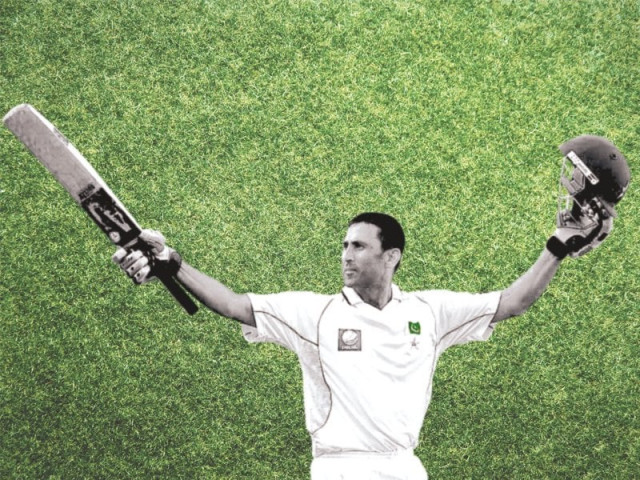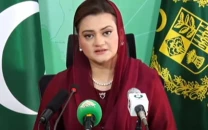Younus Khan: Not out
Despite several personal and professional setbacks, cricketer Younus Khan never threw in the towel

“After so many misfortunes in my family, it is a Herculean task to keep myself from dreading bad news from home whenever I go abroad to play,” says Khan. But the 37-year-old has channeled all his turbulences into a positive force and reminded his fans time and again why he deserves to lead the pack. “Striving to keep my loved ones’ memories alive by doing what I do best trumps all other fears and emotions. I want to do something that will show the world what it means to be the son of [the late] Iqbal Khan.” And true to his word, Khan has only grown in stature ever since the fateful day in January 2005 when he abandoned Pakistan’s tour of Australia to pay his last respects to his father, the man he admires the most till date.

No fairy tale beginning
It was the late 1990s and Khan was toiling for a big break in first-class cricket in Karachi, his adopted home. Despite obvious potential and promise, the chance to succeed kept eluding the youngster like a bewildering will-o’-the-wisp; there just did not seem to be a secure spot for Khan in the metropolis. Some believed that geographical backgrounds mattered a great deal, and that aspiring cricketers closer to the heart of Karachi stood a better chance of securing a spot on the first-class team. “I was often the butt of jokes about living Quaidabad k pul k us paar [on the other side of the Quaidabad bridge],” quips Khan, who spent most of his youth in Steel Town in the outskirts of Karachi.

Younus Khan plays a shot during the first day of the opening Test match against Sri Lanka at the Galle International Cricket Stadium in August last year. PHOTO COURTESY: AFP
Resolving to take matters in his own hands, he risked the little footing he had achieved in Karachi and moved to Peshawar in 1998-1999 to try his luck. Fate did not disappoint him, as he scored over 1,100 runs during his stay.

There was no looking back for Khan after that. In January 2000, he was selected for the national team when Sri Lanka came to tour Pakistan, and scored 46 runs in his very first One Day International (ODI); no mean achievement for a debutant. In the same tour, he struck his first Test hundred in only his second innings, again a remarkable feat with the likes of Saeed Anwar, Aamir Sohail, Inzamamul Haq, Yousuf Youhana and Moin Khan present in the team and only Anwar scoring a respectable 84.
Performance and presentiment
Fast-forward to 2009 and Khan became Pakistan’s captain and topped the ICC Test rankings for batsmen, courtesy of his 313 runs in his first innings as skipper. That year, however, is etched forever in the memories of his fans all over the world not for his achievements in the longest format of the game, but for his ultimate triumph in the showpiece of an entirely opposite type of cricket — the 2009 World Twenty20.

During a practice session before the two-Test series against Sri Lanka in August last year. PHOTO COURTESY: AFP
“The sheer impact of winning a world title was nothing short of overwhelming,” recalls Khan. The fact that it was only the second major trophy for Pakistan [after the 1992 World Cup] magnified [the joy of] spearheading the victorious team for Khan even further. “Such was my state of bewilderment that I still don’t remember who draped the Pakistani flag on my shoulder as we took a lap of honour around Lord’s. Whoever it was, I’m grateful to him for making our celebrations an eternal memory,” he adds.
Khan, who is a strong believer in foresight, reveals some anecdotes that led up to the unforgettable final. Just a day before Pakistan’s semi-final against South Africa, he went up to [the then Pakistan Cricket Board (PCB) chairman] Ijaz Butt and congratulated him on the team’s World Twenty20 win. Butt brushed off his felicitation brusquely, pointing out that they still had a semi-final to play, and that too against one of the stronger teams. “I still insisted on congratulating him, as the feeling that we will win this encounter did not leave me for even a second,” he says.

And win they did, in a nail-biting match that eventually went in favour of the men in green by a margin of just seven runs. The premonitions, however, did not end there.
Khan recalls, sitting with the team manager on the eve of the final and going over the technical aspects of the match. “I saw a coffee mug someone had left on the table. After emptying its remaining contents, I held it aloft and launched into an acceptance speech, the kind one gives after being presented with the trophy,” he says. “Everyone present in the room including me was surprised by the spontaneity, but I ploughed on until the end.”
Once again, his sixth sense prevailed and this time, the eight-wicket victory over Sri Lanka in the final was as convincing and satisfying a win as any captain could hope for.
Caught in a storm
Although essentially a cautious man, Khan has had his share of controversies. Soon after the World Twenty20 triumph, rifts between Khan and the PCB began to surface, which still remain in one form or the other even after countless changes in the management.

Khan resigned as captain during an investigation into match-fixing charges that allegedly took place during his leadership (following the 2009 Champions Trophy semi-final defeat against New Zealand). Although he was cleared, the prolific batsman returned to captaincy only for a three-match series against New Zealand in the UAE , after which he did not take up the mantle again. Thereafter, he was banned for a brief period in 2010 along with Muhammad Yousuf following an inquiry report which blamed the two for inciting divisions within the team after the debacle in Australia where Pakistan didn’t win even a single international, losing all Tests, ODIs and the one-off T20. The ban was eventually lifted after three months.
The most recent examples of the PCB and Khan being at loggerheads include the shocking decision of the board to offer a ‘B’ category central contract — with ‘A’ being the highest category of contracts awarded to players — to the veteran. Upon widespread disapproval and dismay, the decision was immediately reverted and replaced with an ‘A’ contract.

The issue was nowhere close to being resolved when the PCB courted fire once again by dropping Khan from the ODI squad against Australia this year. Their reasoning: Khan scored only three runs on his ODI comeback after a hiatus of almost one-and-a-half years. What the board chose to ignore was the fact that Khan played only one innings in that series against Sri Lanka, after which he had to fly home on account of his nephew’s death.
Perhaps unconsciously, the PCB rubbed salt in the veteran’s wounds by indicating that it would be ‘hard’ to consider a place for him in the upcoming World Cup. The injustice provoked a rare emotional outburst from Younus, who offered to sit out the rest of the matches in all formats until the World Cup. “If they are saying that youngsters are the future of ODIs, then where is the future of Pakistan in Test cricket? Don’t select me in Test matches and make [the youngsters] the future of Pakistan in Test cricket too,” he fumed at the time.
The indispensable batsman
Luckily for him and Pakistan cricket, Khan eventually calmed down enough to reconsider and went to the UAE to feature in the Tests. This was when Test history was rewritten, as the exemplary batsman channelled all his energy and concentration into proving himself indispensible. Records upon records were matched, broken and made. Khan’s single-minded dedication drew reluctant praise from the board and sincere commendation from the opposition. The cricketing world was abuzz with the exploits of the born-again Younus Khan.

Younus Khan was named the ‘Cricket World Player Of The Week’ after scoring two centuries in Pakistan’s 221-run win over Australia in the first Test in Dubai in October, 2014. PHOTO COURTESY: REUTERS
Among numerous records, the batting great now has 28 Test centuries — five of them double tons and one triple — the most by any Pakistani. He became only the third Pakistani to score runs in excess of 8,000 in the longest format of the game, and is also the only Pakistani to have scored a hundred against all Test-playing nations. In the same series, he matched English batsman Herbert Sutcliffe’s record of three consecutive Test tons against Australia. Additionally, he is the only batsman besides Don Bradman and Sutcliffe to have a 50+ average in all the four innings of Tests.
And what was perhaps overlooked by Khan’s peers at home was aptly summarised by Australian captain Michael Clarke in the following words, “Younus is a very good player and has been for a long time. He’s one of the gentlemen of our game and a class player.” As a final touch, Khan struck a century in the following series against New Zealand in the fourth ODI, underlining his determination to prove his point.
Living in the moment
Commenting on his batting philosophy, Khan emphasises the need to stay in the present instead of thinking too far ahead if one is to get some runs.
“I don’t think of who I’m going to face when it’s my turn to bat,” he explains. “My mantra is simple: aim for nothing less than a hundred and give it your best shot no matter who the opposition is,” he says adding that a batsman should always keep things simple and avoid taking unnecessary pressure.
But according to Khan, all this is only possible if a player’s fitness is top-notch. “Apart from following a careful diet, I exercise with any implement available anywhere when I feel the urge to workout. Even a small table can serve as dumbbells,” he says.

With 8,327 Test runs under his belt, what more does Khan want to achieve? “No less than 40 Test centuries, 15 ODI tons and if possible, 10,000 Test runs,” he says with a grin. Whether Younus Khan lives up to his ambitious wish list might be open to speculation for now but his spot on the team for the 2015 World Cup is certainly not.
Aamna Saiyid is a subeditor for The Express Tribune sports desk. She tweets @Aamna_Saiyid
Published in The Express Tribune, Sunday Magazine, January 4th, 2015.



















COMMENTS
Comments are moderated and generally will be posted if they are on-topic and not abusive.
For more information, please see our Comments FAQ